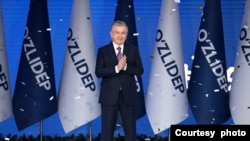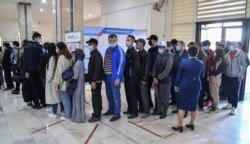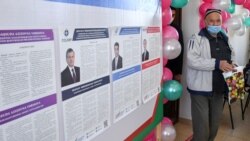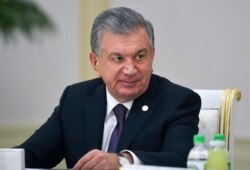Uzbekistan has completed another election without real opposition. Yet Uzbeks, hungry to express their preferences, still turned out to vote, flocking to polling stations at a rate of over 80%. International observers say that is notable in a country that has undertaken halting and tentative reforms in recent years.
Anthony Bowyer of the International Foundation for Electoral Systems spent a month in Uzbekistan monitoring the campaign, visiting 30 polling stations on the October 24 election day. He sees the official turnout number as accurate, calling it a signal that people expect more from their leadership.
President Shavkat Mirziyoyev, who ran for the Liberal Democratic Party, crushed four token rivals: the National Revival Democratic Party’s Alisher Kadirov, the People’s Democratic Party’s Maqsuda Vorisova, the Justice Social Democratic Party’s Bahrom Abduhalimov, and the Ecological Party’s Narzullo Oblomurodov. These putative “opponents” lost badly to an incumbent who won with a whopping 80% of the official tally.
Several voters who talked to VOA on election day said they chose Mirziyoyev in part because he is a known quantity. Some rural voters said they chose the president “even though the changes he promised have not come to our village yet.” For many, his opponents were unknown, their parties irrelevant.
Others, like Rukhsora, a young Tashkent professional, said they are “happy with the changes,” which include greater openness and accountability than during the rule of authoritarian President Islam Karimov from 1989 to 2016. “The fact that we still have many problems does not make him a bad president."
Uzbekistan has struggled to reflect opposition in a government-managed vote. Tashkent students complained that other candidates did not bother seeking their votes. “If you want to become president, should you not try to win hearts and minds? They can’t expect our vote just because their name is on the ballot,” said Sobir from Kashkadarya.
All candidates toured the country, while their representatives held community forums. But they were never seen together. And candidate debates are unheard of in Uzbek presidential elections.
Yet many voters remember live TV debates during parliamentary elections in 2019 as an exciting hint of what could be. But this time, two debates featuring the candidates’ representatives went unnoticed.
“Should not this be something the presidential nominees personally do?” asked a group of law students, attending political forums at the International Media Hall in Tashkent.
A group of international observers concluded Monday that “the lack of genuine pluralism and meaningful engagement between candidates or with citizens meant that Uzbekistan’s presidential election was not truly competitive, while significant procedural irregularities were noted on election day.”
But Sherzod Qudratkhoja, rector of the University of Journalism and Mass Communications in Tashkent and a member of the Central Election Commission, said it is not easy to satisfy everybody in a country of 35 million, most of whom are under age 45.
“The incumbent’s clear win does not mean that competition was unfair and undemocratic,” Qudratkhoja said.
“It’s unfair to criticize the absence of heated debates and personality-based campaigns. Uzbekistan is a modest society, and we never claim to be good at political advertising and election strategy. It’s clear we lack experience, but we are honest about it. This is not some spectacle. Believe me, we feel the difference now.”
The joint observation mission from the OSCE Office for Democratic Institutions and Human Rights (ODIHR), the OSCE Parliamentary Assembly, and the European Parliament, acknowledged extensive legal reform but said election legislation still does not yet fully comply with international standards for democratic elections.
“This election has shown that the democratic reforms of recent years must be carried forward,” said Reinhold Lopatka, leader of the short-term OSCE observer mission. “Full respect for basic freedoms and real competition among political forces, which were lacking, will be essential to live up to the people’s democratic aspirations.”
Russian, Chinese and Central Asian leaders rushed to congratulate Mirziyoyev but Washington issued a cautiously optimistic statement that did not name the president himself.
“We concur with the OSCE-ODIHR monitoring mission’s observation that the vote was peaceful and characterized by high voter turnout but share the OSCE mission’s concerns that the elections took place in an overly restrictive political environment and that important election safeguards were disregarded,” said the State Department.
The Biden administration called on Tashkent to expand civil and political rights.
Mirziyoyev, for his part, has pledged to improve livelihoods within the span of his second and constitutionally final five-year term.
But experts caution that he may change the constitution. After all, no Uzbek leader has yet left office democratically, with his predecessor dying in office after more than 25 years in power.
A group of pro-Mirziyoyev bloggers told VOA they hope he will break that mold to set an example.
“If he turns into yet another strongman, following the path of our previous president, Islam Karimov, everything Mirziyoyev has been doing will be quickly forgotten,” said one.
Mirziyoyev’s constant refrain that his government is committed to serve the people resonates deeply with supporters who may ultimately call for him stay on.
Foreign observers criticized “excessively strict requirements for the right to become a candidate, together with burdensome party registration rules.”
The distinction between incumbency and candidacy was blurred, reported the OSCE, giving Mirziyoyev an undue advantage. It criticized the fact that even private media provided more coverage to him than to the other four candidates combined.
Party officials agree Uzbekistan “deserves better campaigns and elections” but argue that citizens should work towards those goals, mirroring the growing spirit of political activism in the country.
“The recent and ongoing reforms are an encouraging sign,” said Heidi Hautala, head of the European Parliament delegation. “But the exclusion of opposition parties and the lack of genuine competition, as well as the high number of irregularities we saw on election day, remain substantial obstacles in the path of democratization.”
Hautala urges that the system Mirziyoyev leads should open further, letting citizens form a genuine civil society.
However, many question the need for a formal opposition, reflecting an innate conservatism born of decades of authoritarian rule. “Will opposition solve our longstanding problems?” asked a middle-aged female voter. “Explaining all problems by pointing to the lack of opposition is quite naïve. I travel around the world and don’t think opposition parties are a solution.”
Bahrom Kuchkarov, vice chair of the Central Election Commission, says citizens are the ultimate judges: “We know the shortcomings, but this election is a step forward.”



